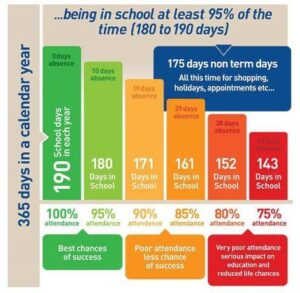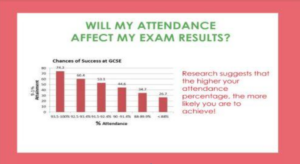Attendance Information

At Piper’s Vale Primary Academy we are aiming for all of our young people to have good attendance and punctuality. This is 95% attendance or above. But what does this mean?
- 95% attendance means that your child has missed two weeks of school in that school year.
- 90% attendance means that your child has missed four weeks of school/half a day every week.
- 80% attendance means that your child has missed eight weeks of school.
- Attendance of below 90% over five years is equivalent to your child missing half a year of school.
- Attendance below 80% over five years means that your child misses a whole year of school.
You must let us know that your child is absent.
Telephone 01473 320413 – or email info@pipersvale.org.uk
We will require the following information:
- Date
- Student name
- Detailed reason for absence
- Medical evidence if appropriate
- Name of person reporting absence
Please report all absences before 9am
Please contact the school on a daily basis for continued absence.
Accessing your child’s attendance record
You can access your child’s attendance record on the MCAS app.
Good attendance is 95% and above. Our aim is for all students at Piper’s Vale Primary Academy to achieve good attendance. The below will help provide guidance on the difference between an authorised absence and an unauthorised absence. Please note these lists are for guidance, the decision of authorised/unauthorised absence is at the discretion of the Principal.
Authorised absence
- Illness (please provide evidence when possible. GP text, receipt for purchased medications or prescriptions counterpart)
- Emergency dental/medical appointment (please make routine appointments after school or during the holidays)
- Day of religious observance
- Other exceptional circumstances e.g. participation in a public performance with an approved licence application from the Local Authority.
Unauthorised absence
- If no explanation is received from the parent/carer
- Insufficient detail given for child’s absence e.g. “Student is unwell today”
- If attendance is below 95% and no medical evidence is provided
- For looking after siblings
- Shopping trips
- Unexceptional special occasions e.g. birthdays
- For family holidays where prior permission was not sought or was refused
The importance of good attendance and punctuality

Good attendance is a necessary contributor to ensuring the best possible outcomes for all pupils to:
Be healthy
• Attendance at school supports children’s emotional and social health and development.
• the school curriculum teaches children to be healthy.
Stay Safe
• Schools have a statutory duty to promote the safety and welfare of children.
• the best way to safeguard children is to ensure they attend school regularly.
Enjoy and Achieve
• Good school attendance supports children in reaching their maximum potential and enjoying the fulfilment this brings.
Make a Positive Contribution
• Membership of a school community builds confidence, gives children a sense of belonging and teaches them to contribute to and be responsible for the well-being of others.
Achieve Economic Well-Being
• Good school attendance supports engagement in further education, employment or training in the future, which in turn helps to support a prosperous and fulfilling lifestyle.
Early Help
It is important for children to receive the right help at the right time to address risk and prevent issues escalating.
Therefore, at Paradigm Trust we aim to identify where early interventions are needed to support families in need by closely monitoring children and highlighting any emerging issues. If necessary, and with appropriate consent, information is shared, or meetings are convened with other professionals to support effective early help assessments. We recognise that some children may particularly benefit from early help including a child who:
- Is disabled and has a specific additional need
- Has special educational needs (whether or not they have a statutory Education, Health and Care Plan
- Is a young carer
- Is showing signs of being drawn into anti-social or criminal behaviour, including gang involvement and associated with organised crime groups
- Is frequently missing/goes missing from care or from home
- Is at risk of modern slavery, trafficking or exploitation
- Is at risk of being radicalised or exploited
- Is in a family circumstance presenting challenges for the child, such as drug and alcohol misuse, adult mental health issues and domestic abuse
- Is misusing drugs or alcohol themselves

